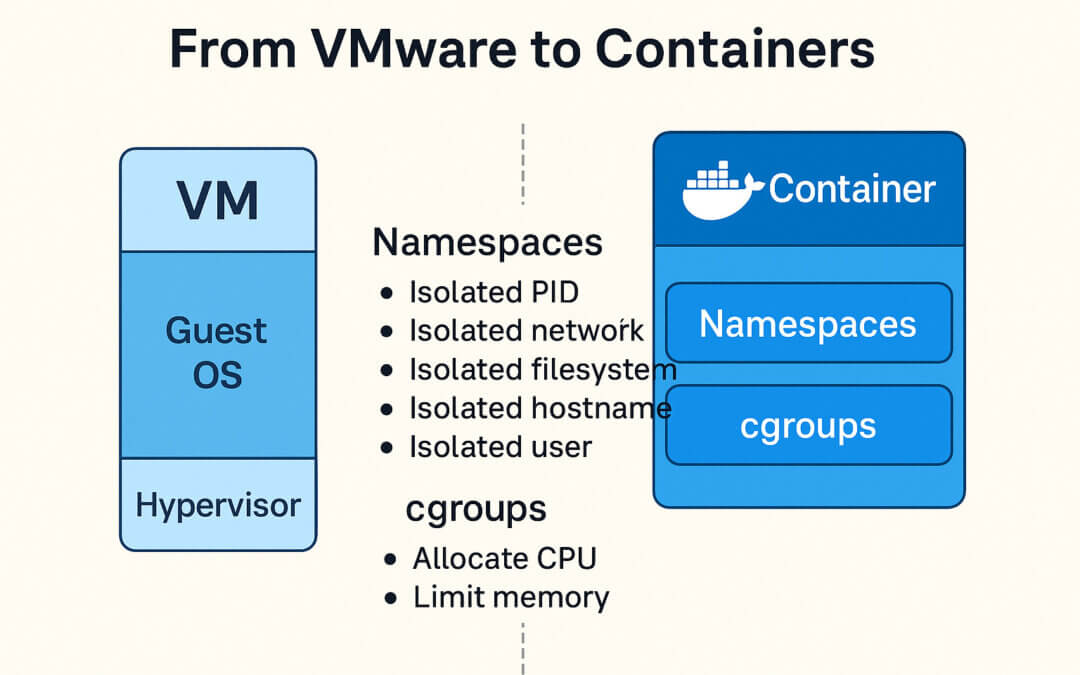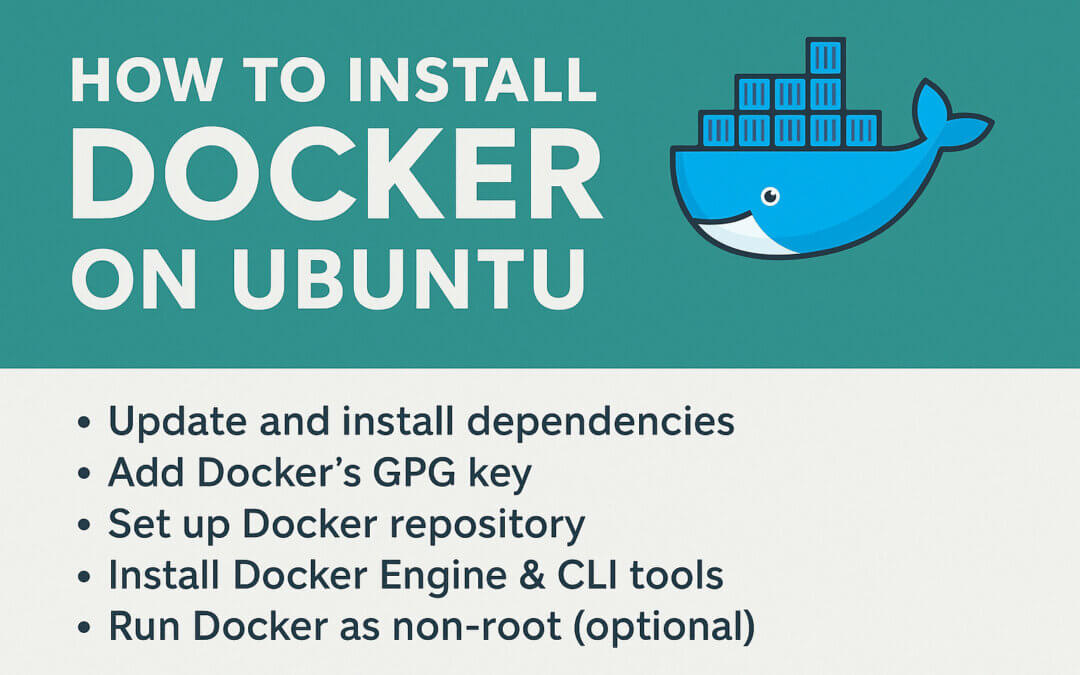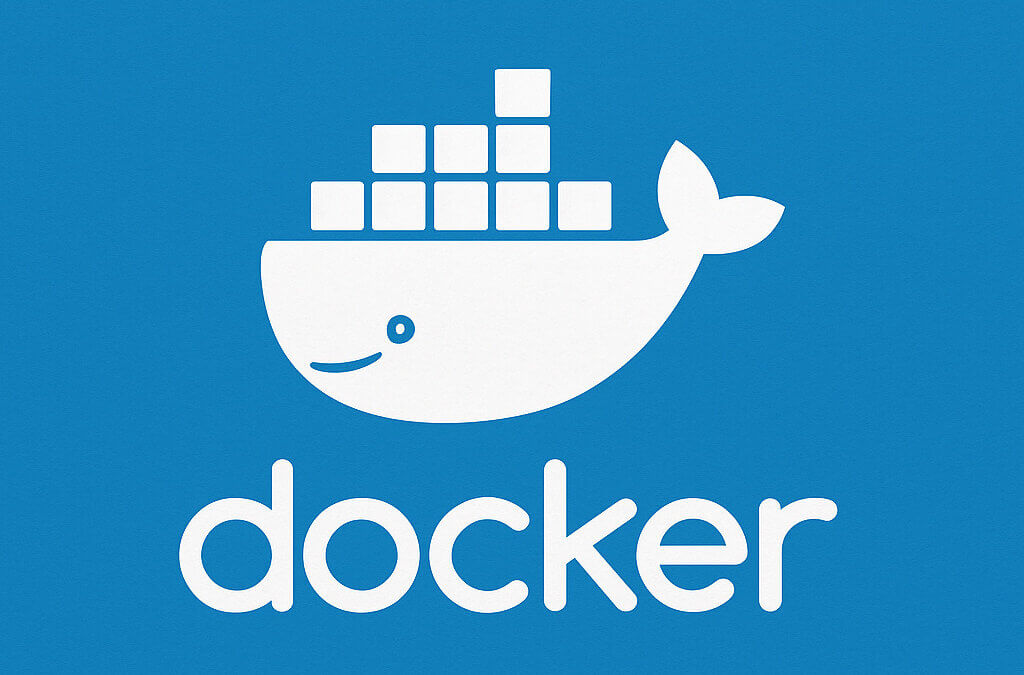🚪 Introduction: The Container Illusion Containers are not magic. They don’t run in a “box.” They’re not virtual machines. They’re just Linux processes — with a twist. If you’re working with Docker or Kubernetes and your understanding stops at pod.yaml and...
 🚀 From VMware to Containers: Understanding Linux Namespaces and cgroups for DevOps Engineers 🧭 Introduction So you’re coming from a VMware ESXi world. You’re used to spinning up VMs, assigning CPU, RAM, storage, virtual NICs, and keeping everything nicely...
🚀 From VMware to Containers: Understanding Linux Namespaces and cgroups for DevOps Engineers 🧭 Introduction So you’re coming from a VMware ESXi world. You’re used to spinning up VMs, assigning CPU, RAM, storage, virtual NICs, and keeping everything nicely...
 Docker has become a fundamental tool in modern DevOps workflows — from local development to CI/CD pipelines and production deployments. If you’re working with Ubuntu and want to set up Docker properly, here’s a clear, step-by-step guide to get you up and running...
Docker has become a fundamental tool in modern DevOps workflows — from local development to CI/CD pipelines and production deployments. If you’re working with Ubuntu and want to set up Docker properly, here’s a clear, step-by-step guide to get you up and running...
 Learn how Docker works from a Windows Server admin’s perspective. Discover what containers are, how they compare to virtual machines, and get the top 10 Docker commands you need to start working with containers. Docker for Former Windows Server Admins: A Beginner’s...
„You don’t truly understand Docker until you stop thinking in commands and start thinking in layers.“ Welcome to the ultimate deep-dive into Docker’s internal architecture – beyond the typical „10 must-know commands“ and into what really makes...
runc is: A tiny but critical tool for containers. It’s a command-line utility that can create and run containers according to the Open Container Initiative (OCI) spec. It’s actually what Docker (and many other container systems) use under the hood to start and manage...
Running Docker on VMware / vSphere (VSX, etc.) in your own datacenter: Still depends on your hardware (if the server dies, the VM dies, containers die). Still depends on your VMware infrastructure (and VMware itself can crash or have bugs). You add another layer of...
Why you wouldn’t run hundreds of containers directly on bare metal: Single point of failure → if the kernel or hardware dies, everything dies. Kernel risk → one bad kernel update could wipe out hundreds of containers at once. Hard to isolate performance issues →...
Short version: LXC and Docker containers share the host’s kernel. They don’t have their own separate kernel inside the container. So: if the host’s kernel changes (upgrade, patch, bug, security fix) → it immediately affects all containers running on...
Nice one — here’s the simple version: Control groups (cgroups) = control „how much“ resources a process can use (CPU, memory, disk I/O, network, etc.). Example: „This container can only use 1 CPU and 512MB RAM.“ Namespaces = control...
Learn how Docker works from a Windows Server admin’s perspective. Discover what containers are, how they compare to virtual machines, and get the top 10 Docker commands you need to start working with containers. Docker for Former Windows Server Admins: A Beginner’s...
„You don’t truly understand Docker until you stop thinking in commands and start thinking in layers.“ Welcome to the ultimate deep-dive into Docker’s internal architecture – beyond the typical „10 must-know commands“ and into what really makes...
runc is: A tiny but critical tool for containers. It’s a command-line utility that can create and run containers according to the Open Container Initiative (OCI) spec. It’s actually what Docker (and many other container systems) use under the hood to start and manage...
Running Docker on VMware / vSphere (VSX, etc.) in your own datacenter: Still depends on your hardware (if the server dies, the VM dies, containers die). Still depends on your VMware infrastructure (and VMware itself can crash or have bugs). You add another layer of...
Why you wouldn’t run hundreds of containers directly on bare metal: Single point of failure → if the kernel or hardware dies, everything dies. Kernel risk → one bad kernel update could wipe out hundreds of containers at once. Hard to isolate performance issues →...
Short version: LXC and Docker containers share the host’s kernel. They don’t have their own separate kernel inside the container. So: if the host’s kernel changes (upgrade, patch, bug, security fix) → it immediately affects all containers running on...
Nice one — here’s the simple version: Control groups (cgroups) = control „how much“ resources a process can use (CPU, memory, disk I/O, network, etc.). Example: „This container can only use 1 CPU and 512MB RAM.“ Namespaces = control...


